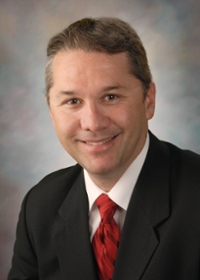
It seems inevitable now that Marcos I. Restrepo, MD, MSc, PhD, would become a physician-scientist. Growing up in Medellin, Colombia, in a home with “a lot of science”—his father practiced tropical medicine and his mother was a bacteriologist—he knew by the time he was in middle school that he wanted to be a doctor.
His parents helped shape his professional life in other ways. They volunteered for missionary and research work in poor areas of their country, where diseases like malaria and parasites ravaged communities. “I went into medicine to take care of those who suffer,” Dr. Restrepo says.
Of all his many responsibilities today, the one that he finds most gratifying is caring for veterans at the South Texas Veterans Health Care System, where he is director of the medical ICU. “I am very grateful to these patients for their commitment to our country and am honored to give something back,” he says.
From Colombia to the U.S.
How did the science-philic middle-school kid from Colombia end up in Texas?
After graduating from medical school in Colombia, Dr. Restrepo decided on a career in infectious diseases. With limited opportunities for subspecialty training there, he applied for a University of Texas Health San Antonio research fellowship. He’s been there ever since, and today he’s an associate professor with multiple responsibilities in clinical care, research, and education.
“I saw that in the United States, medicine was science and team driven,” he says. But after a couple years of working in a lab, he realized that he “really needed to see patients.”
While completing his residency at UTHSA in preparation for a fellowship in infectious diseases, he “fell in love” with the ICU. Torn between infectious diseases and pulmonary/critical care, Dr. Restrepo decided to complete all three subspecialties.
This unique combination of training has made him a stand-out clinician. “When we have tough infectious disease issues that arise in our pulmonary patients, we always run to Marcos first,” says Stephanie Levine, MD, a UTHSA mentor who is a professor of pulmonary and critical care medicine. The combination has also made him a valuable member of the writing committees for the ATS/Infectious Disease Society of America guidelines on hospital-acquired pneumonia and ventilator-acquired pneumonia (published in 2015) and a forthcoming guideline on community-acquired pneumonia.
Getting Research Ideas from Patients
Respiratory infections and their complications have been Dr. Restrepo’s research focus for two decades. After identifying the “clinical peculiarities” that produce worse pneumonia outcomes, his research shifted to therapeutic strategies. This, in turn, motivated him to create animal models for respiratory disease and, most recently, cardiovascular disease.
“I get most of my ideas from my patients,” Dr. Restrepo says. The cardiovascular complications—arrhythmias, heart attacks, heart failure—that he saw in ICU patients with severe pneumonia has led him to look at pneumonia’s consequences, with and without the administration of antibiotics.
Through the ATS International Conference, Dr. Restrepo says he formed friendships and national and international collaborations that have advanced the research he and his team are doing in Texas. The most recent collaboration resulted in a truly global study that was published in 2016 in Lancet Infectious Diseases (and was the basis of his thesis for a PhD from the University of Valencia).
“We believed that MRSA treatment was being overused at many centers around the world.” Dr. Restrepo explains. “So we recruited physicians from 22 hospitals in 54 countries on 6 continents to record the risk factors, treatment, and laboratory results of pneumonia patients during one 24-hour period.”
The volunteer researchers (there was no money for the study—just the promise of being a coauthor of the study) found that MRSA was present in only three percent of patients.
Teaching and Mentoring the Next Generation
During his tenure at UTHSA, Dr. Restrepo has also earned a reputation as an outstanding educator. In 2004, medical students and residents voted him Fellow of the Year, and in 2013, he was recognized for Excellence in Educational Innovation by the Association of Pulmonary and Critical Care Medicine Program directors. As associate director of the pulmonary/critical care fellowship program, Dr. Restrepo designed and teaches a two-week long course in research methodology that prepares fellows to conduct research “at a much higher level than required by the ACGME,” says Dr. Levine, who is fellowship program director.
Dr. Restrepo also helps medical students start research careers. “He is unlike any other mentor I’ve had,” says Alex Shaffer, a second-year medical student in his lab. “He really challenged me to think deeper about problems by asking questions and encouraging me to think outside the box.”
People Make the Difference
Reflecting on his career, Dr. Restrepo says that he is most grateful to the many people who have helped him at every stage of his career, particularly his mentor at UTHSA, Antonio Anzueto, MD, who is chief of the pulmonary section. He is also grateful to the ATS, which has enabled him “to share knowledge and a passion for medicine with people around the world.”
Dr. Restrepo and his wife, Monica, have two “beautiful and smart” school-age daughters. In his spare time, he plays tennis and soccer, watches movies, and enjoys traveling with his family.

